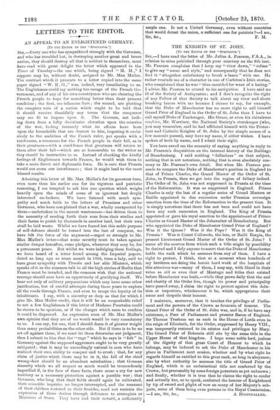LETTERS TO THE EDITOR.
AN APPEAL TO AN ENLIGHTENED GERMANY.
[TO THE EDITOR OF THE "SPECTATOR.")
SIR,—Every one who has sympathized strongly with the Germans, and who has trembled lest, in destroying another great and brave nation, they should destroy all that is noblest in themselves, must have read with great delight the letter which appeared in the Times of Tuesday—the one which, being signed " M. M.," I s4pose may be, without doubt, assigned to Mr. Max Muller. The contrast which it presents to a letter copied into the same paper signed " W. R. G.," was, indeed, very humiliating to us. The Englishman could say nothing too savage of the French Go- vernment, and of any of his own countrymen who are cheering the French people to hope for something better than their present condition ; the first, are infamous liars ; the second, are plotting the complete ruin of a nation which ought to be told that it should receive thankfully any terms that the conqueror may see fit to impose upon it. The German, not look- ing down from a lofty doctrinaire elevation upon the miseries of the war, feeling intensely what its effects have been upon the households that are dearest to him, imputing it exclu- sively to the ambition of the French ruler, yet speaks with a tenderness, a reverence for the French people in their fall, as in their greatness—with a confidence that greatness will return to them after their fall—which are as honourable to the writer as they should be instructive to us. Instead of checking the kindly feelings of Englishmen towards France, he would wish them to take a more direct and diplomatic form. He is sure that Prussia would not scorn our interference ; that it might lead to the most blessed results.
Admiring this letter of Mr. Max Miiller's for its generous tone, even more than his earlier one for its vigorous and patriotic reasoning I am tempted to ask him one question which weighs heavily upon the minds of some of us ignorant but deeply interested on-lookers. We have listened with much sym- pathy and much faith to the letters of Prussians and other Germans, who have complained that a war, wholly unexpected by them—undertaken in the merest wantonness—has driven them to the necessity of sending forth their sons from their studies and their farms to perish by thousands in another land, lest their own shall be laid waste. Whilst we have feared lest this noble purpose of self-defence should be turned into the lust of conquest, we have felt the force of the argument—urged so strongly in Mr. Max Miiller's letter—that some security must be taken against similar danger hereafter, some pledges, whatever they may be, for a permanent peace. But whilst we were indulging these feelings, we have heard of a letter found among the Imperial papers, dated so long ago as some month in 1868, from a lady, said to have great sympathy with Prussia and her able Minister, which speaks of it as the common talk in all the high circles of Berlin that France must be invaded, and the common wish that the national revenge should soon have an opportunity of gratifying itself. We hear not only of military preparations which may have some other justification, but of careful attempts during these years to explore all the roads through France, and even to tempt the loyalty of its inhabitants. I say, with a sincerity as deep as that for which I give Mr. Max Muller credit, that it will be an unspeakable relief to not a few Englishmen if this letter of Madame Pourtales could be shown to be spurious, or if the charges which seem to confirm it could be disproved. An expression even of Mr. Max Miiller's own opinion that they are of no worth would be very consolatory to us. I can say, for one, that I should deem it of greater weight than many probabilities on the other side. But if there is to be no set-off against those, if we must let them determine our judgment, then I submit to him that the " rage " which he says is "felt" in Germany against the supposed aggressors ought to be very greatly mitigated ; that it may be exceedingly natural in men who have realized their own ability to conquer and to crush ; that, for any claim of justice which there may be in it, the fall of the chief wrong-doer should be an abundant satisfaction ; that German sincerity which we all respect so much would be tremendously imperilled if, in the face of these facts, there arose a cry for new territory as a necessary protection against a possible war ; that Germans, who long that their fields should again be cultivated, their scientific inquiries no longer interrupted, and the remnant of their children restored to their firesides, need not restrain the expression of those desires through deference to strategists or Ministers of State. They have had their reward, a sufficiently ample one. Is not a United Germany, even without countries that would detest the union, a sufficient one for patriots ?—I am,


































 Previous page
Previous page